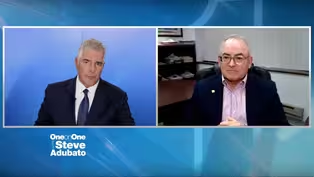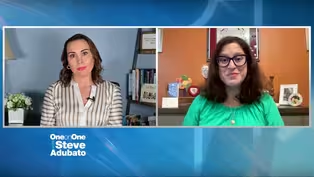One-on-One
Making a difference in the lives of foster-care families
Clip: Season 2025 Episode 2775 | 7m 56sVideo has Closed Captions
Making a difference in the lives of foster-care families
As part of our "Making A Difference" Special Series, Steve Adubato sits down with Phyllis DiNardi, founder of We Are Loved and 2024 Russ Berrie Making A Difference Award Honoree, to discuss how her non-profit supports and empowers both foster children and parents as they navigate the challenging foster care system.
Problems playing video? | Closed Captioning Feedback
Problems playing video? | Closed Captioning Feedback
One-on-One is a local public television program presented by NJ PBS
One-on-One
Making a difference in the lives of foster-care families
Clip: Season 2025 Episode 2775 | 7m 56sVideo has Closed Captions
As part of our "Making A Difference" Special Series, Steve Adubato sits down with Phyllis DiNardi, founder of We Are Loved and 2024 Russ Berrie Making A Difference Award Honoree, to discuss how her non-profit supports and empowers both foster children and parents as they navigate the challenging foster care system.
Problems playing video? | Closed Captioning Feedback
How to Watch One-on-One
One-on-One is available to stream on pbs.org and the free PBS App, available on iPhone, Apple TV, Android TV, Android smartphones, Amazon Fire TV, Amazon Fire Tablet, Roku, Samsung Smart TV, and Vizio.
Providing Support for PBS.org
Learn Moreabout PBS online sponsorship(upbeat music) - We're now joined by Phyllis DiNardi, who's the founder of an organization called We Are Loved.
Phyllis, good to see you.
- Good to see you too, Steve.
- Lemme also say that you're a 2024 Russ Berrie Making a Difference winner.
And we'll explain more about what that award is, Making a Difference.
What is We are Loved and how is it tied to the fact that you have fostered as a foster parent, 48 children as a foster parent?
Please.
- So We Are Loved is a nonprofit that I found after, actually I foster 49 Children.
But who's counting, right?
So the last two girls that I had, the 48th and the 49th were sisters.
And it was founded when I thought I was gonna be their forever home.
But unfortunately things changed and they were returned to their biological mom and we worked hard to make relationship with their biological moms to make sure that they were gonna be safe when they were returned home.
And when we brought them to their home and had them settled in, they did turn to us and they said, "Mrs. D, we're gonna be okay 'cause we know we are loved."
So with that, we took that information and we decided to start our nonprofit because I wasn't willing to give up on the kids in foster care.
I was no longer gonna foster because we moved into an adult community.
But the kids that we did foster and we've seen the potential that they had with some love and structure could do very, very well.
We wanted to continue that journey.
And this is where we are today.
- Phyllis, what exactly does We are Loved do for these children and for foster parents?
- So right now we definitely support them with our Loved bags, which are bags that are given to them when they're transitioning into foster care with new pajamas and hygiene products, stuffed animal, a book or journal.
We noticed that when the children came to our home, we had these items and we were able to give them some new pajamas and wash them up and everything.
They had a great night the first night.
We have support meetings.
We help with training.
We give them holiday boxes to help start traditions in their life.
I have six of my own children and eight grandchildren, and we all have those pajamas that match during the holidays.
And so we have our holiday pajamas with the kids, all sibling groups get the matching pajamas and a blanket and slippers and hot chocolate and cookie mixes.
And again, they're a big hit because a lot of the siblings, foster kids will say, "I've never had matching pajamas with my siblings."
And they get very excited about it.
So we're trying to teach them what tradition is like and have that bond in their family some stuff.
- Phyllis, what needs to be improved in your opinion?
I mean, you're an expert on this, you've lived it, you've practiced it, in the foster care system, dare I use that term, what needs to be improved specifically?
- I think what needs to be improved is the ability for the workers and for the resource parents to be able to listen to the kids, especially the older kids.
We have a tendency, they don't prioritize what the needs of the kids are.
It's all about statistics and numbers and saying, "Oh, we kept these many kids home.
We kept these many kids adopted."
And nobody really listens to what the needs of the kids are.
I mean, a lot of times we say, "Oh, it's great that we kept them with their families.
Oh, it's great that we put them and adopt these kids out."
But we don't really ask the kids what they want and what's best for them.
And it's sad because a lot of these kids are able to say what they want and sometimes it may not be what we think is best for them.
- So Phyllis, let's get into that.
And not every kid is the same, obviously.
What do most children who wind up in the foster care system, what do most of them want and need?
- Well, it depends on what they're given during their time in foster care, right?
So the children that we had in our home, because I had six children and I ran a daycare and everything, I'm very structured, very organized.
So the kids in our home, I guess they wanted to have that kind of a future.
So they wanted to continue to be able to develop that.
They did very well in school.
A lot of them were on the honor roll.
They saw that my children did well in school.
They were in college.
They had nice things.
And I showed them that you can work towards those.
They saw goals were able to be met, right.
- Phyllis, I'm sorry to interrupt, what about the love piece?
- So the love and the structure is super important, right?
But with that, you got, that's why you have to have a lot of structure and consistency, but then like they know that they're being loved.
'Cause if you need though, you have to discipline a child or have structure, you could say no or you have to guide them, that shows them love.
- Phyllis, what do you think is the biggest change in you, biggest impact on you of fostering 49 children, having six of your own, what's the biggest impact this had on you?
- It showed me that I needed to appreciate the smaller things in life and that just being able to change someone's life even in a little way or making a positive impact went a long way.
- What's that feel like?
- It's a great feeling.
It's a wonderful feeling.
Matter of fact, two of my previous foster kids reached out just recently, this past week actually.
One's married with a 3-year-old and one's a senior in college and they're brother and sister actually, and they both appreciated their time with us.
They were with us for several years actually.
And thanked us for what we had helped them and guided them to do.
And we love that.
We love that we know that we made a difference in several children's lives and their future and where they're at today.
- Phyllis, you've made a difference in the lives of so many.
Phyllis DiNardi is the founder of We Are Loved.
And Phyllis, we thank you so much for joining us.
We appreciate it.
- Thank you, Steve.
I appreciate your time, too.
- You got it.
Stay with us, we'll be right back.
- [Narrator] One-On-One with Steve Adubato is a production of the Caucus Educational Corporation.
Celebrating 30 years in public broadcasting.
Funding has been provided by The Russell Berrie Foundation.
NJM Insurance Group.
PSEG Foundation.
Newark Board of Education.
Johnson & Johnson.
PSE&G, Wells Fargo.
Community FoodBank of New Jersey.
And by Horizon Blue Cross Blue Shield of New Jersey.
Promotional support provided by CIANJ, and Commerce Magazine.
And by ROI-NJ.
CEO of Mercer Street Friends examines rising food insecurity
Video has Closed Captions
Clip: S2025 Ep2775 | 10m 27s | CEO of Mercer Street Friends examines rising food insecurity (10m 27s)
The importance of preserving Holocaust survivors' stories
Video has Closed Captions
Clip: S2025 Ep2775 | 9m 58s | The importance of preserving Holocaust survivors' stories (9m 58s)
Providing Support for PBS.org
Learn Moreabout PBS online sponsorship
- News and Public Affairs

Top journalists deliver compelling original analysis of the hour's headlines.

- News and Public Affairs

FRONTLINE is investigative journalism that questions, explains and changes our world.












Support for PBS provided by:
One-on-One is a local public television program presented by NJ PBS

